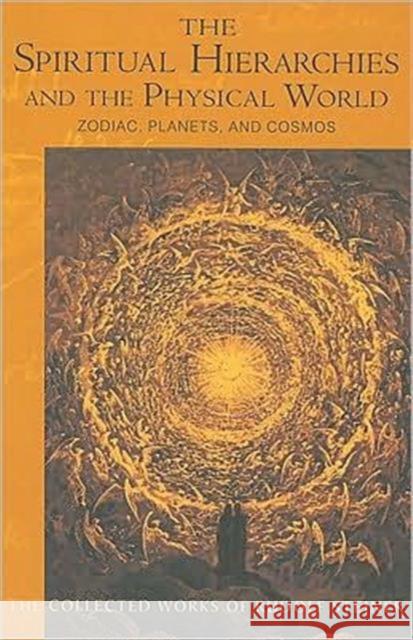Spiritual Hierarchies and the Physical World: Zodiac, Planets and Cosmos » książka
Spiritual Hierarchies and the Physical World: Zodiac, Planets and Cosmos
ISBN-13: 9780880106016 / Angielski / Miękka / 2008 / 198 str.
10 lectures in Dusseldorf, April 12-18, 1909; notes by participants from question-and-answer sessions (CW 110)
April 21 - 22, 1909
Ever since nature and consciousness were separated during the late Middle Ages--giving rise to scientific thinking that considers only the physical world and views the mind as merely an epiphenomenon of neural chemistry--the spiritual beings who are the universe have felt abandoned and unable to complete their work, which depends on human collaboration for its suc-cess. Human beings have likewise felt aban-doned and alienated.
In these remarkable lectures, Rudolf Steiner reestablishes the human being as a participant in an evolving, dynamic universe of living spiritual beings: a living universe, whole and divine. He does so in concrete images, capable of being grasped by human consciousness as if from within.
How is this possible? Implicit in Rudolf Steiner's view is the fact that, essentially, the universe consists of consciousness. Everything else is illusion. Hence, to understand the evolution of the cosmos and humanity in any terms other than consciousness is also an illusion. Whenever we are dealing with grand cosmic facts, we are dealing with states of consciousness.
But states of consciousness never exist apart from the beings who embody them. Therefore, the only true realities are beings in various states of consciousness. In this sense, Steiner's spiritual science is a science of states of consciousness and the beings who embody them. Indeed, any science--physics, chemistry, botany, psychology--is a science of beings. And the sensory perception, or physical trace, is simply the outer vestment of the activity of beings in various states of consciousness. To describe these beings, Steiner uses the names made familiar by the wisdom traditions of the West. He speaks of the evolutionary states of Saturn, Sun, Moon, and so on; the nine choirs of angels; elemental beings and nature spirits; and the elements of fire, earth, air, and water.
LECTURES:
- The Renewal of Primeval Wisdom
- The Four Elements, Fire, and the Elemental Beings:
the Lowest Realm of the Hierarchies - Planetary Evolution: Saturn and Sun Stages
of Evolution and the Spirits of Personality - The Work of the Spiritual Hierarchies and the Zodiac
- Cosmic Evolution and the War in Heaven
- Geocentricity and Heliocentricity in Cosmic Evolution
- The Constitution of Spiritual Beings and Humanity
- The Spiritual Hierarchies, the Zodiac, and the Human Being
- Evolution and the Cosmic Human Body
- The Christ
The Spiritual Hierarchies and the Physical World: Zodiac, Planets & Cosmos is a translation from German of Geistige Hiearchien und ihre Wiederspiegelung in der physischen Welt. Tierkreis, Planeten, Kosmos (GA 110). The Spiritual Hierarchies and the Physical World: Reality and Illusion (1996) contained a previous edition of this lecture course.











